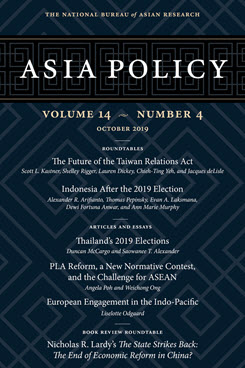European Engagement in the Indo-Pacific
The Interplay between Institutional and State-Level Naval Diplomacy
This article examines Europe’s comprehensive Indo-Pacific strategy by investigating the interplay between the European Union’s institutional diplomacy and French-led naval diplomacy in the South China Sea and the Indian Ocean.
EXECUTIVE SUMMARY
MAIN ARGUMENT
China is attempting to expand its presence in the South China Sea and the Indian Ocean at the expense of the U.S. alliance system. Europe contributes to countering the China challenge with a division of labor between the EU and groupings of member states. The EU level provides institutional diplomacy and economic and security partnerships. At the member-state level, a French-led group of EU states provides naval diplomacy in the Indo-Pacific and signals transatlantic unity on core values and interests such as the freedom of navigation and strengthening democracies against authoritarian encroachments. European diplomacy draws on soft- and hard-power instruments in regions where until the mid-2010s it had a negligible footprint. The effort also involves building strategic networks at the institutional and state levels to enhance power-projection capabilities.
POLICY IMPLICATIONS
- Although Europe defends core liberal values shared with the U.S., it does so from an independent position that advances its own interests. That being said, U.S. and European differences of interests are predominantly operational and can be used to establish a division of labor to more effectively address challenges related to shared values such as freedom of navigation and democracy.
- European activism does not involve a united EU acting as a bloc with one voice on all issue areas. Europe’s footprint in the Indo-Pacific begins at both the EU and state levels and uses soft- and hard-power instruments to advance common transatlantic objectives as well as specific European interests.
- Concerns about U.S. security guarantees are prompting European and Indo-Pacific states such as India, Japan, Australia, and the ASEAN countries to build cooperative links independent from the U.S. The reshuffling of alliance and partnership responsibilities may end up strengthening the U.S. alliance system by creating new strategic networks among partners.
Liselotte Odgaard is a Senior Fellow at the Hudson Institute, where she specializes in U.S.-Europe-China relations.
About Asia Policy
Asia Policy is a peer-reviewed scholarly journal presenting policy-relevant academic research on the Asia-Pacific that draws clear and concise conclusions useful to today’s policymakers. Asia Policy is published quarterly in January, April, July, and October and accepts submissions on a rolling basis. Learn more


